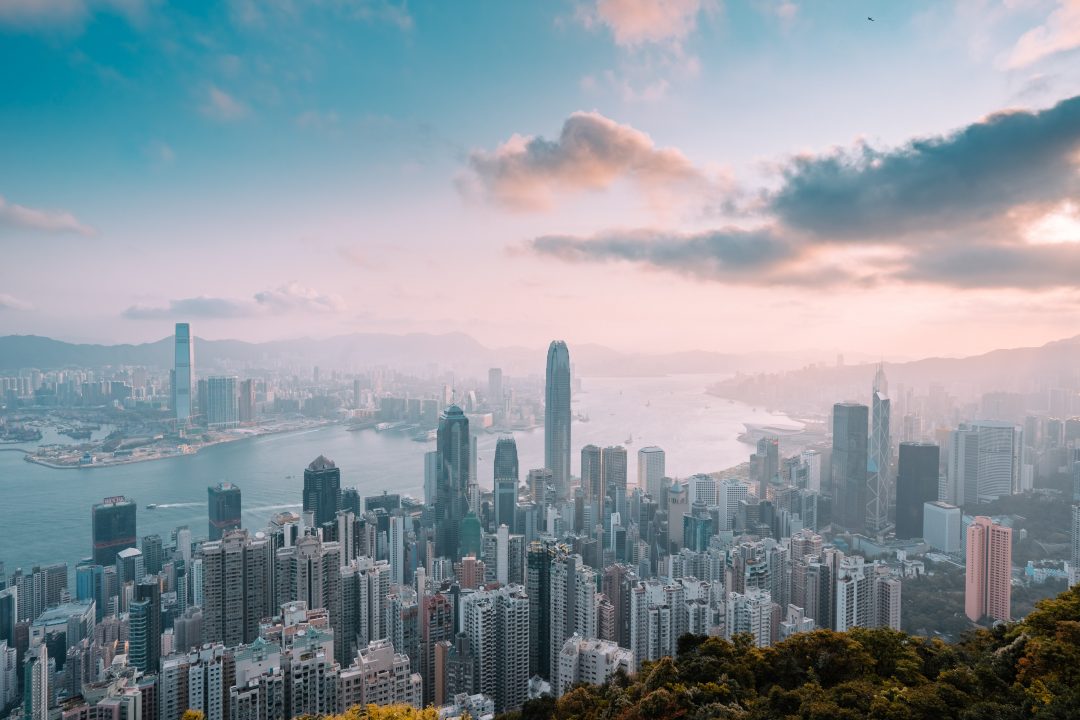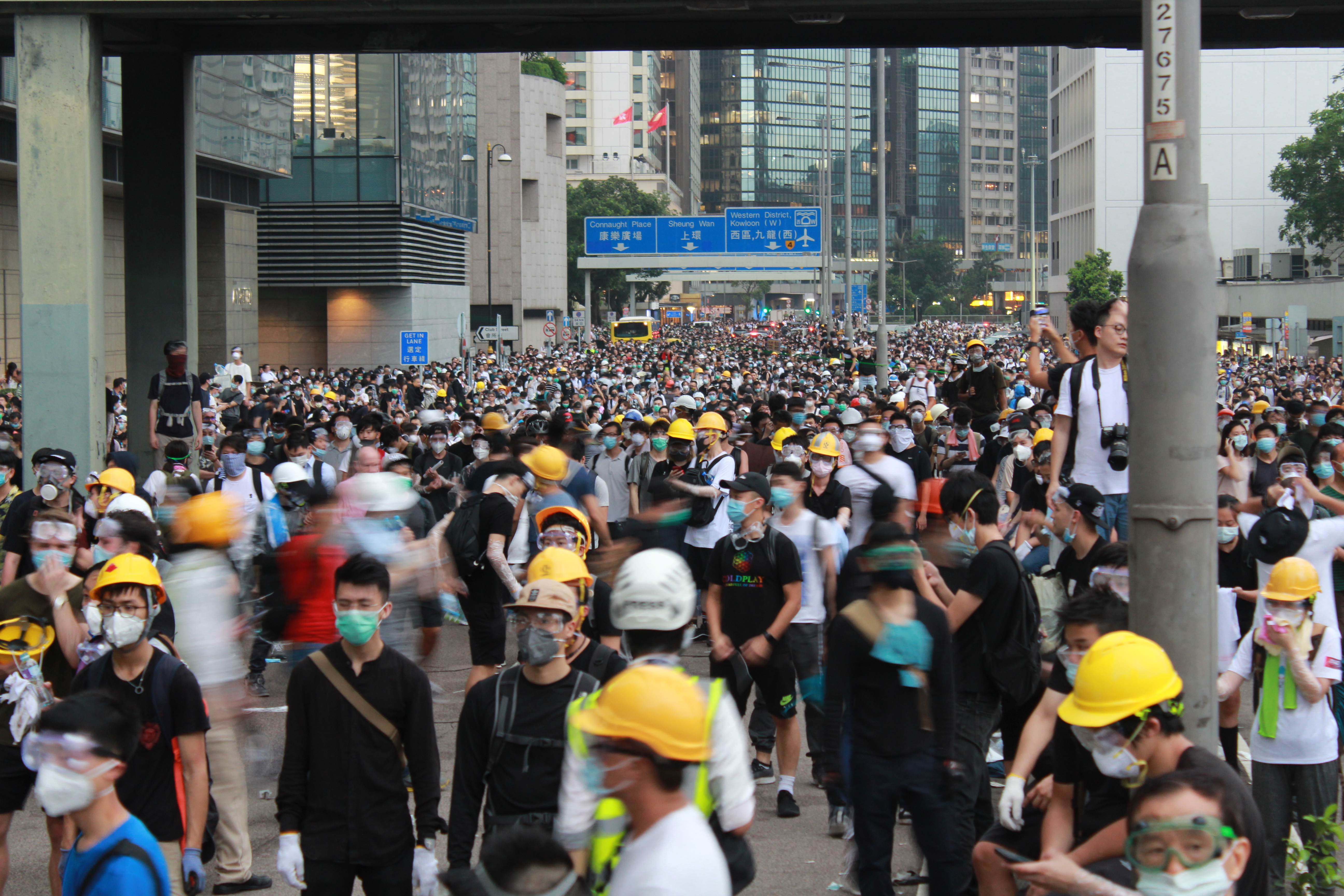Photo: Media representatives hold a letter expressing their concerns outside the government headquarters in Hong Kong on Oct. 8. © AP
Since assuming sovereignty over Hong Kong in 1997 — and particularly since the “umbrella movement” pro-democracy protests four years ago — China’s Communist rulers have been moving steadily but unmistakably to assert total control over the former British colony, imposing their concept of “one country” at the expense of the promise of “two systems.”
The Hong Kong government’s decision in early October to effectively expel a senior Financial Times journalist on seven days` notice by refusing to extend his visa was unprecedented and marked the latest step in Beijing’s concerted effort to erode Hong Kong’s freedoms.
Recent developments underscore the reality of modern China, where unprecedented strength runs parallel with heightened fear of showing weakness; even as the country becomes increasingly assertive on the global stage and clashing openly with the United States, it is also growing steadily more nationalistic and repressive at home.
While many other countries are looking to China to show global leadership, shore up international treaties, and bolster the world trading system, Beijing is showing total disregard for accepted international behavior.
China brazenly detained the Chinese head of Interpol, Meng Hongwei, accusing him of bribery. Last year, Chinese security agents snatched a mainland billionaire from Hong Kong’s luxury Four Seasons Hotel and spirited him over the border into detention, where he remains. In Muslim-dominated Xinjiang province, thousands are reportedly in detention without trial.
On the face of it, China should be oozing confidence not paranoia, given its unparalleled economic record. President Xi Jinping this year ended presidential term limits to be able to stay in power indefinitely and become the most powerful Chinese leader since Mao Zedong. China’s Communist Party looks as strong and the country as unified as at any time in modern history.
But the truth is that China’s rulers have reason to be fearful. President Donald Trump’s trade war is beginning to have an impact, and China has effectively run out of American products to hit with retaliatory measures. Growth is slowing, new export orders are dropping, consumer spending is lagging, the stock market has fallen, and the country is facing a mountain of domestic debt. Overseas, its Belt and Road Initiative is facing pushback from countries wary of taking on huge loans.
Potential economic crisis at home typically makes China’s leaders more assertive abroad, and more jittery about the prospect of internal unrest, not least in Hong Kong.
While the world still considers Hong Kong a global city, Beijing’s leaders clearly view it as another Chinese territory, like Guangdong Province, but one whose colonial history and Western traditions make it an object of suspicion.
And while outsiders still view Hong Kong as an economic dynamo essential to the mainland’s success, since Britain handed over sovereignty to Beijing 21 years ago the situation has gone into reverse. In 1997, Hong Kong accounted for around 16% of China’s total gross domestic product; today, it accounts for only around 3%. As China has grown richer, it needs Hong Kong less as its “entrepot” to the outside world. But Hong Kong needs China more than ever.
International investors still largely favor Hong Kong for its open business atmosphere, the impartiality of its courts, and the relative freedom from corruption. But as the American Chamber of Commerce noted, business relies on a free press and a free flow of information to allow capital markets to function. AmCham, in a statement, said; “A free press is a core component of Hong Kong’s success.”
Western countries, especially Britain and the United States, believed they still had influence over Hong Kong’s future and China’s behavior because of the 1984 Sino-British Joint Declaration, registered as an official treaty with the United Nations. But China made its view clear one year ago when its foreign ministry declared the Joint Declaration “a historical document” that now “no longer has any practical significance.”
China told the world; Hong Kong is ours, so butt out.
So Western countries, foreign businesses and international media outlets based in Hong Kong now face a dilemma. Beijing has shown it is impervious to outside pressure and brushes off complaints about Hong Kong as meddling in its “internal affairs.” For most, relocating is not a viable option yet, since much of the rest of the region is even more inhospitable to the foreign press. But staying may mean operating under new restrictions and fears of crossing one of Beijing’s unspecified “red lines” — the “chilling effect” many warn about.
Since the 2014 “umbrella movement” protests unnerved China’s leaders, Beijing has curtailed Hong Kong’s autonomy, demonstrated that China will act with impunity inside Hong Kong, and enforce a sense of Chinese patriotism many young people here do not feel. A poll this year, on the anniversary of the handover, found that only 16% of young people aged between 18 and 29 felt proud to be Chinese citizens.
Beijing has long made clear that it treats calls for separatism as a “red line” — whether they emanate from Tibet, Xinjiang, Taiwan or Hong Kong. So when the government announced it was weighing a ban on an obscure political party advocating independence, and the Foreign Correspondents’ Club invited party founder Andy Chan to give a luncheon talk, the result was a collision between Hong Kong’s tradition of free speech, and Beijing’s attempts at stifling dissent.
Victor Mallet, the FCC’s first vice president, presided over the meeting. He works for the Financial Times, which, like the Nikkei Asian Review, is part of the Nikkei business information company.
Chinese officials were at one point invited to attend the lunch to provide balance, but predictably declined. But while Chan’s party was still legal at the time, and there is no law prohibiting any specific talk, China’s foreign ministry and its liaison office — which increasingly runs Hong Kong affairs — made clear there would be retribution once the club went ahead with the event.
Expelling a respected foreign correspondent is shocking. But more worrying is that China is feeling so insecure that it sees a tiny political party on its periphery as a major threat to the stability of the state.
In the last 40 years, China has emerged from poverty and isolation to become a global superpower and, on current trends, is poised to pass the United States as the world’s largest economy in a few years. It should be a cause for celebration. But the fact that China’s leaders are acting in such a paranoid fashion at their moment of triumph suggest perhaps they understand the gathering political and economic storm clouds better than anyone.
Keith B. Richburg, a former foreign editor of The Washington Post, is director of Hong Kong University’s Journalism and Media Studies Center.
Original link: https://asia.nikkei.com/Opinion/China-s-assault-on-Hong-Kong-s-freedoms-threatens-city-s-global-role




